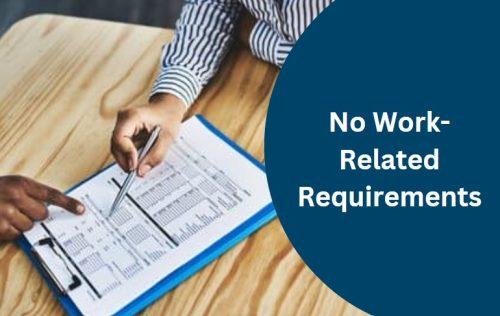Post Contents
Here we unravel the mysteries of being placed in the Support Group for Employment and Support Allowance (ESA) in the UK. If you’ve found yourself pondering what happens if you’re put in this group, fret not! We’re here to guide you through all the important implications that come with it. So, grab a cuppa, sit back, and let’s dive into this intriguing subject together! Let’s find out the answer to your question “What happens if I am put in the support group for ESA” Let’s delve!
What Happens if I Am Put in the Support Group for ESA?
Financial Support

When you are placed in the Support Group for ESA, it means that your health condition or disability is severe and limits your ability to work. One of the important benefits of being in this group is the financial support you receive. The rate of ESA you will receive is higher compared to if you were placed in the Work-Related Activity Group (WRAG) or receiving Jobseeker’s Allowance.
This higher rate reflects the fact that individuals in the Support Group have more severe health conditions and are not expected to undertake any work-related activities. It acknowledges that your circumstances require additional financial assistance because finding employment may not be feasible given your condition.
By providing a higher level of financial support, the UK government aims to alleviate some of the economic strain associated with living with a severe health condition or disability. This allows individuals within the Support Group to focus on managing their health and well-being without added stress about meeting basic needs.
The intention behind this difference in rates between groups recognizes that those with more profound limitations face unique challenges when it comes to engaging with employment opportunities. This targeted approach ensures that individuals who genuinely need greater financial assistance can access it, providing them with a measure of stability during difficult times.
Being placed in the Support Group for ESA means you will receive a higher level of financial support than other groups because your health condition severely limits your ability to work and engage in work-related activities.
No Work-Related Requirements

When you are placed in the Support Group for Employment and Support Allowance (ESA), one major advantage is that you are not required to undertake any work-related activities. Unlike individuals in the Work-Related Activity Group (WRAG), there are no job-seeking obligations imposed on you.
This means that you will not be asked to attend work-focused interviews or complete any tasks related to employment. The focus shifts from finding work to managing your health condition or disability. This can provide much-needed relief for those who have severe limitations on their ability to work due to their health conditions.
Being exempt from these requirements, allows individuals in the Support Group to prioritize their well-being and concentrate on managing their health without worrying about fulfilling job-seeking obligations. It acknowledges the challenges they face and provides them with a supportive environment where they can focus solely on their health needs.
The absence of work-related requirements also gives individuals more flexibility and control over how they spend their time. They can use this time for self-care, attending medical appointments, or engaging in activities that promote better physical and mental well-being.
Being placed in the Support Group for ESA means that you do not have any work-related requirements imposed upon you. This allows you to prioritize your health while receiving necessary financial support without having additional pressures associated with job-seeking or employment-related tasks.
Continuation of Benefits
Continuation of Benefits: Your ESA entitlement will continue as long as your health condition or disability persists, and you continue to meet the eligibility criteria for the Support Group.
Once you have been placed in the Support Group for ESA, you can rest assured that your financial support will be ongoing. The continuation of benefits is a crucial aspect of being in this group. As long as your health condition or disability remains severe enough to limit your ability to work, and you fulfil the requirements set by the government, you will receive ESA.
This means that even if it takes time for your health situation to improve or if there are no prospects of returning to work in the near future, you can rely on this vital lifeline. It provides a sense of security and stability during challenging times when managing day-to-day expenses might become overwhelming.
However, it’s important to note that regular health assessments may still be conducted while you are in the Support Group. These assessments aim to determine if there have been any changes in your circumstances or improvements in your health condition. They ensure that individuals who truly require assistance continue receiving their benefits without interruption.
Remember, being part of the Support Group not only guarantees financial support but also offers peace of mind knowing that help is available when needed most.
Access to Other Benefits

Being placed in the Support Group for ESA not only provides financial support but also opens up access to other benefits and allowances that can greatly improve your overall income. One such benefit is the Enhanced Disability Premium.
The Enhanced Disability Premium is an additional payment that you may be eligible for if you are in the Support Group. This premium is specifically designed to provide extra financial assistance to individuals with severe health conditions or disabilities. It serves as a recognition of the additional costs associated with living with these conditions.
By receiving the Enhanced Disability Premium, you can expect an increase in your overall income, which can help ease some of the financial burdens caused by your health condition or disability. This extra support can make a significant difference in your day-to-day life and provide some much-needed relief.
It’s important to note that eligibility for this premium will vary depending on individual circumstances and specific criteria set by the government. However, being placed in the Support Group increases your chances of qualifying for this valuable benefit.
Being part of the Support Group not only provides higher rates of ESA but also grants access to additional benefits like the Enhanced Disability Premium. These added allowances can make a real difference in improving your financial situation and helping you manage any extra costs associated with your health condition or disability.
Regular Assessments
Once you are placed in the Support Group for ESA, it’s important to note that your journey doesn’t end there. Regular assessments will still be conducted to evaluate whether your health condition has improved or if there have been any changes in your circumstances. These assessments play a crucial role in determining your continued eligibility for ESA.
During these periodic assessments, various factors will be taken into consideration. Medical professionals and assessors will review any medical evidence you provide, along with other relevant information about your condition. The purpose of these assessments is not to penalize or inconvenience you but rather to ensure that you receive the appropriate level of support based on your current situation.
The frequency of these assessments can vary depending on individual circumstances. Some individuals may undergo more frequent evaluations while others may have longer intervals between assessments. It’s important to stay informed about the assessment process and respond promptly to any requests or communications from the Department for Work and Pensions (DWP).
Remember that regular reassessments do not necessarily mean that you will automatically lose eligibility for ESA. They are primarily aimed at ensuring that you continue receiving the right level of support based on accurate and up-to-date information about your health condition or disability.
By participating openly and providing all necessary documentation during these periodic assessments, you can help maintain a smooth continuation of benefits within the Support Group as long as they remain necessary for your well-being and ability to work.
Exemption from the Benefit Cap

Being placed in the Support Group for ESA comes with various benefits, and one of them is exemption from the benefit cap. This means that if you are in the Support Group, the total amount of benefits you receive will not be limited by the cap.
The benefit cap is a limit on the total amount of welfare benefits that an individual or household can receive. It was introduced as a measure to control spending and ensure fairness in the welfare system. However, individuals in the Support Group are exempted from this limitation.
This exemption provides some relief and security for those who have severe health conditions or disabilities that prevent them from working. It ensures that they continue to receive adequate financial support without any restrictions imposed by the benefit cap.
By exempting ESA recipients in the Support Group from this limitation, it recognizes their unique circumstances and acknowledges their need for additional assistance. It helps alleviate some of the financial pressures they may face due to their health condition or disability.
This exemption allows individuals in the Support Group to focus on managing their health conditions without worrying about exceeding any limitations on their benefits. It offers them peace of mind knowing that they will continue to receive necessary support regardless of any benefit caps imposed elsewhere within the welfare system.
Conclusion
Being placed in the Support Group for Employment and Support Allowance (ESA) can have significant implications for individuals with severe health conditions or disabilities. Here’s a summary of what happens if you are put in the support group for ESA:
- Financial Support: You will receive a higher rate of ESA compared to those placed in the Work-Related Activity Group or receiving Jobseeker’s Allowance.
- No Work-Related Requirements: Unlike individuals in the WRAG, you are not required to undertake work-related activities or participate in job-seeking activities.
- Continuation of Benefits: Your ESA entitlement will continue as long as your health condition or disability persists, and you meet the eligibility criteria for the Support Group.
- Access to Other Benefits: Being in the Support Group may make you eligible for additional benefits and allowances, such as Enhanced Disability Premium, which can increase your overall income.
- Regular Assessments: Periodic assessments may still be carried out while you are in the Support Group to ensure ongoing eligibility.
- Exemption from Benefit Cap: If you’re placed in the Support Group, your ESA is exempt from the benefit cap, providing greater financial security.
While being part of the Support Group offers crucial financial assistance and relief from work-related requirements, it’s important to remember that circumstances may change over time. Regular assessments help determine continued eligibility based on any improvements or changes to your health condition. Stay informed about any updates regarding ESA regulations and seek guidance from relevant authorities when needed.
If you find yourself placed within this group, take advantage of available resources and support systems that cater specifically to your needs. Remember that there are organizations dedicated to assisting individuals who require extra care due to their severe health conditions or disabilities.
Being put into the support group for ESA provides essential financial stability without imposing excessive work-related burdens. It aims at prioritizing individual well-being by acknowledging limitations caused by severe health conditions or disabilities.


